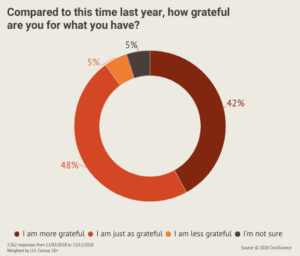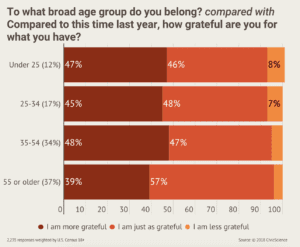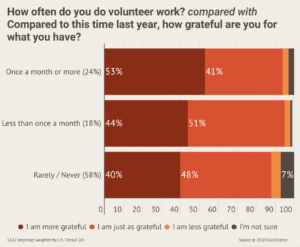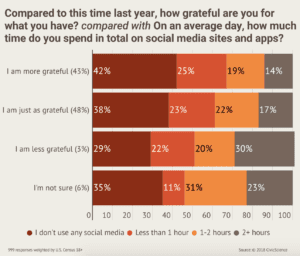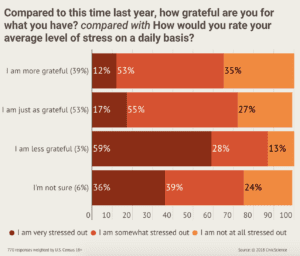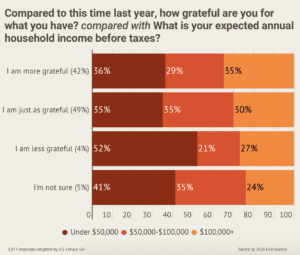As Thanksgiving rolls around, reflecting on what you’re grateful for is commonplace. Research has shown that there are physical, psychological, and emotional benefits to having a sense of gratitude. But, what aspects of life impact feelings of gratitude and thankfulness?
A CivicScience survey of over 2,300 U.S. adults studied how grateful people feel this year compared to last year:
Overall, the bulk of the U.S. adult population, 90%, reported feeling more grateful (42%) or just as grateful (48%) when thinking back to last year.
The research shows that there are several factors that can shape a person’s level of gratitude.
Lifestage
At first glance, life stage doesn’t seem to have much of an impact on gratitude:
Most age groups feel similar on the gratitude front, excluding those who aren’t sure if they’re more, less, or just as grateful. While it’s a small percentage, those under 25 are the most likely to say they feel less grateful this year. Another group that stands out are those aged 55 or older. This population is more likely to say they’re “just as grateful” compared to last year, and less likely to say they’re “more grateful” than other age groups, suggesting that older adults feel consistently grateful as they move through life.
Volunteering
Next, looking at something popular around the holidays – volunteering. While just under ¼ of U.S. adults volunteer once a month or more 54% of people who volunteer often say that they feel more grateful this year compared to last year. On a larger scale, the more time a person spends volunteering, the more likely they are to say they’re “more grateful” compared to last year.
Whether it’s helping others that makes someone feel grateful or vice versa, there’s a definite correlation.
Social Media Usage
We know that the amount of time we spend on social media can impact our behaviors. But, social media usage could also play into feelings of gratitude. Frequent social media users, those who use it for 2+ hours each day, are the most likely to say they feel less grateful this year compared to last.
Conversely, people who say they’re more grateful aren’t active on social media at all (42%). Perhaps staying off of social media sites can help us to feel more grateful – especially when we have the tendency to compare ourselves to others.
Stress
It may not come as a surprise, but for some, feelings of stress may outweigh feelings of gratitude. Adults in the U.S. who say they feel less grateful this year are much more likely to feel very stressed out on a daily basis (59%). On the other hand, the “more grateful” crowd is the least likely to say they experience a high level of stress daily (12%).
Income
Personal finances and income levels can permeate virtually all aspects of life – including gratitude. Those in the <$50,000 income bracket make up the highest percentage of people who feel less grateful compared to last year. But, it’s worth noting that those who are “more grateful” this year come from all income brackets.
While these are only a few aspects of life that shed light on how a person’s sense of gratitude can change, there’s certainly a correlation between gratitude, circumstances, and habits. Still, most adults feel just as, if not more, grateful this year, signaling that maybe despite these factors, there’s at least some ability to cultivate gratitude in our lives.
